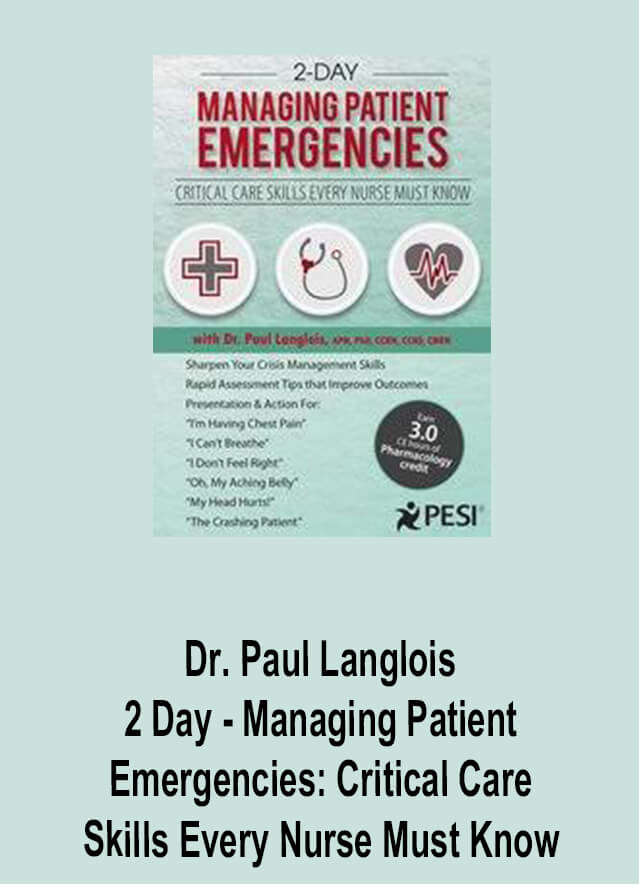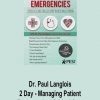Dr. Paul Langlois – 2 Day – Managing Patient Emergencies: Critical Care Skills Every Nurse Must Know
Original price was: $299.00.$89.00Current price is: $89.00.
Compare- Description
Description
Download Immediately!
Watch Proof Content Below:

Dr. Paul Langlois – 2 Day – Managing Patient Emergencies: Critical Care Skills Every Nurse Must Know
- Sharpen Your Crisis Management Skills
- Rapid Assessment Tips that Improve Outcomes
- Presentation & Action For:
- “I’m Having Chest Pain”
- “I Can’t Breathe”
- “I Don’t Feel Right”
- “Oh, My Aching Belly”
- “My Head Hurts!”
- “The Crashing Patient”
Mrs. Kelp is admitted with pneumonia and right-sided heart failure. Twenty minutes after admission, she develops worsening dyspnea and hypotension.
- Are you prepared to manage her unstable condition?
- Do you know what respiratory measures are necessary?
- Do you know the best way to manage her hypotension?
The patients in our hospitals are sicker than ever before. It is not uncommon to find patients on regular medical floors with central lines, chest tubes, pacemakers and AICDs. Some nursing homes are accepting patients on ventilators, and patients are now being sent home on vasoactive drips such as dobutamine. Even though acuity levels are higher, you are still caring for many patients and don’t have the luxury of frequent, comprehensive assessments. Therefore, it is important to be able to rapidly assess and implement appropriate interventions. Attend this seminar to sharpen your skills and leave prepared to identify and manage your next patient emergency!
- Analyze two types of rapid assessment techniques and how to employ them for the best results during a patient emergency.
- Evaluate techniques for getting critical information during a rapid patient assessment.
- Investigate EARLY assessment findings in clinical syndromes that may progress rapidly and cause life-threatening conditions.
- Prioritize nursing actions for specific neurological, cardiac, respiratory and endocrine emergencies.
- Explore care of the diabetic patient in diabetic ketoacidosis versus HHNK/HHS.
- Breakdown heart failure with regards to left- and right-sided failure.
- Evaluate patient populations who are at high-risk for bedside emergencies.
- Communicate how to integrate assessment data and critical lab findings into the plan of care for a patient experiencing a life-threatening emergency.
- Employ a strategic approach in evaluating abdominal pain for the most accurate assessment.
- Evaluate the difference between ischemic and hemorrhagic stroke in both symptoms and treatment priorities.
- Communicate the most common causes of arterial blood gas abnormalities.
- Analyze pain management and sedation options for the patient experiencing an acute illness.
Identifying the RED Flags
- Critical Thinking During a Crisis
- Vital Signs & ABCDs
- Methods for Establishing and Maintaining Airway
- Breathing: More Than a Rate Issue
- Circulation & Perfusion
- Differential Diagnosis – 4 Methods of Determining Cause
- Rapid Assessment Techniques
- Critical Questions to Ask Your Patient
- Identifying High-Risk Populations
- Pre-Morbid Conditions
- Age Considerations
Cardiovascular Prevention, Presentation, Action for: “I’m having chest pain”
- Recognizing Arrhythmias – Stable, Unstable and Lethal
- 12-Lead EKG: Just the Down and Dirty
- Utilizing a Systematic Approach
- Patterns of Ischemia, Injury & Infarct
- Acute Myocardial Infarction: STEMI/NSTEMI
- Key Assessments & Interventions
- tPA Guidelines
- Cath Lab Intervention
- Laboratory Parameters
- Recognizing Subtle Changes
- Heart Failure
- Recent Advances in Care
- Medication Management
- Managing Intake and Output
- Vascular Abnormalities
Respiratory Prevention, Presentation, Action for: “I can’t breathe”
- Assessment & Critical Interventions for:
- Pulmonary Embolism
- Pulmonary Edema
- Acute Asthma Attack
- Spontaneous Pneumothorax
- Allergic Reactions
- The Patient Who Needs Assistance
- O2, CPAP, BiPAP
- Indications for Intubation
- Positive Pressure Ventilation
- Chest Tube Management
- Ventilator Settings Every Nurse Must Know
- Easy ABG Analysis…Really!
Endocrine Prevention, Presentation, Action for: “I don’t feel right”
- The Differences of DKA and HHNK
- Early Recognition of Hypoglycemia
- Thyroid Storm: Physical and Psychiatric Symptoms
- Managing Adrenal Crisis
- Critical Lab Findings
Gastrointestinal Prevention, Presentation, Action for: “My aching belly”
- Warning Signs of Acute Pancreatitis
- Upper vs. Lower GI Bleeding
- Perforated Bowel
- Early Signs of Small Bowel Obstruction – Illeus
- Interpreting the Lab Tests
Neurological Prevention, Presentation and Action for: “My head hurts!”
- Elevated Intracranial Pressure
- Clues When you Don’t have a Monitor
- Ischemic vs. Hemorrhagic Stroke
- Inclusion/Exclusion for tPA
- Essential Assessments post-tPA
- Management Strategies for Seizures
- The Patient in Withdrawal
- Known vs. Suspected ETOH/Drug Abuse
- Interventions for Delirium Tremors
- Critical Labs
Renal Prevention, Presentation and Action for: “I can’t make urine”
- Acute vs. Chronic Kidney Disease
- Recognizing Acute Kidney Injury
- Key Assessments
- Interpreting the Lab Data
Pain, Agitation & Delirium
- Analgesics: Too Much or Too Little
- Managing the Bedside Procedure
- Type of Sedating Medications
- Ensuring Appropriate Monitoring
- Delirium: So Many Causes, So Many Options…
- Key Assessments & Interventions
Managing the Decompensating Patient
No Pulse, No Blood Pressure, No Respirations…Now What?
- Identifying Cardiac Causes
- Street Drugs & Poisoning
- Critical Assessments & Interventions
- MUST KNOW Reversal Agents










